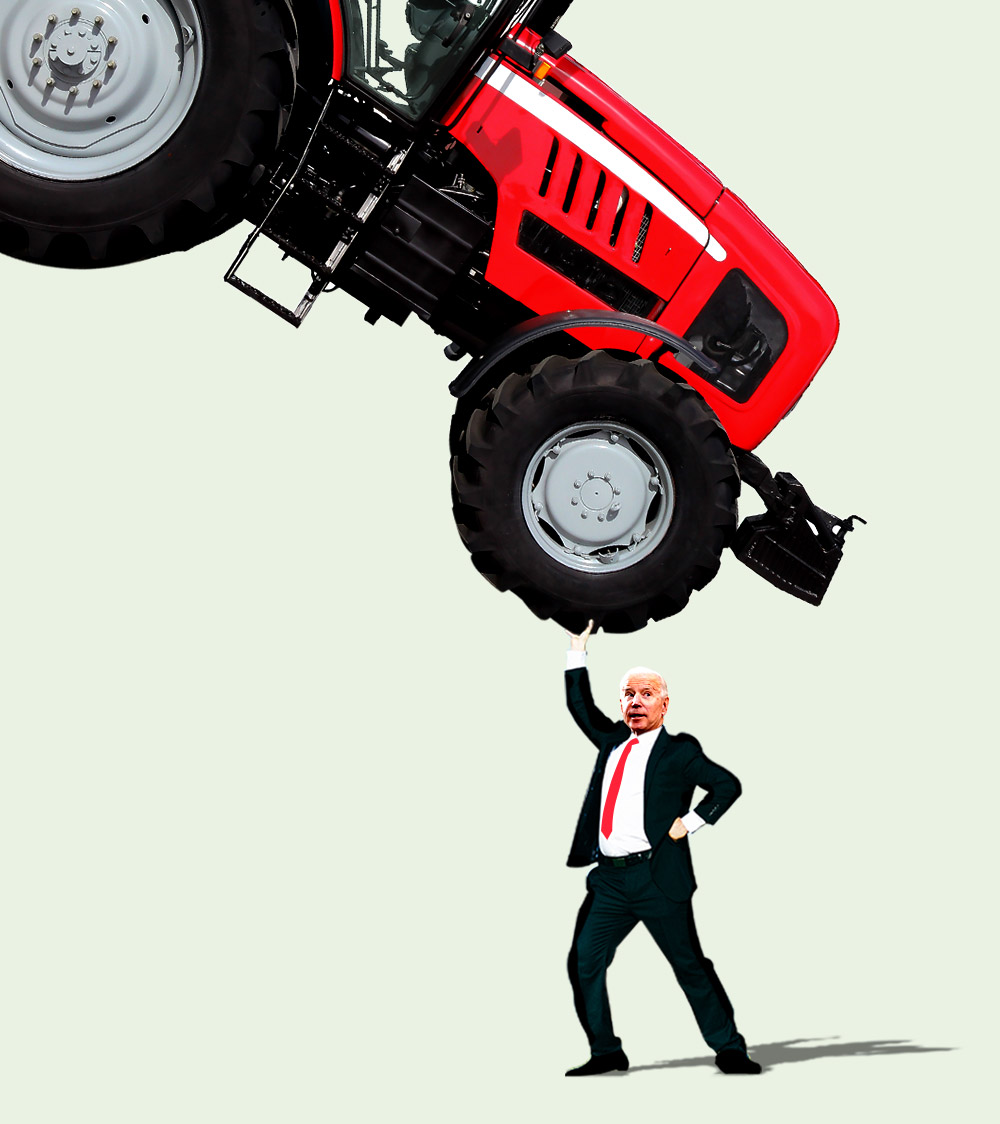President Joe Biden looks like he’s ready to bust up some monopolies, and it’s not just tech oligarchs who should be worried.
After he tapped antitrust stalwarts Lina Khan to the Federal Trade Commission and Tim Wu to the National Economic Council, media accounts focused on a possible crackdown of the giant companies that dominate the internet. “Biden taps another Big Tech trustbuster,” declared Politico Playbook. “Biden Is Assembling a Big Tech Antitrust All-Star Team,” echoed Wired. And for good reason. Khan, a legal scholar most recently at Columbia University, made headlines in 2017 with her blistering paper “Amazon’s Antitrust Paradox,” an exposé of the everything store’s monopolistic behavior and the assault on the the antitrust establishment that has allowed it to flourish. She also served as counsel for the House Subcommittee on Antitrust, Commercial and Administrative Law and co-authored its landmark 2020 report teasing out Big Tech’s anti-competitive tendencies. Wu, author of the 2018 book The Curse of Bigness: Antitrust in the New Gilded Age and also a Columbia Law School professor, is most famous for coining the phrase “net neutrality” and calling for Facebook to be broken up.
But their hirings should make agribusiness titans quake, too. Biden’s appointments might now be famous for wanting to break up big tech. But both have aimed their antitrust chops at farm country, too, says Joe Maxwell, executive director of Family Farm Action, a non-profit that fights corporate control of agriculture. “Those are tremendous choices,” Maxwell said of Wu and Kahn. “They signal a seriousness about antitrust within the Biden administration that was not indicated in his campaign.”
Like the internet, agriculture is a prime example of a sector under the grip of corporate hyper-consolidation. Democratic and Republican administrations alike have watched idly while the seed and pesticide markets merged under the control of four globe-spanning conglomerates. The German chemical giant Bayer, which subsumed US seed/agrichemical giant Monsanto in 2017, is allowed to aggressively market the herbicide dicamba (along with seeds for cotton and soybean crops designed to withstand it) with scant pushback from the Environmental Protection Agency, despite overwhelming evidence that it is easily airborne and wreaks havoc on neighbors’ land. Mega-players like Tyson, JBS, and Smithfield dominate the meat industry; they have flexed their political power during the coronavirus pandemic, operating their factory-scale slaughterhouses with little federal restraint even as tens of thousands of workers tested positive for COVID-19 and hundreds died.
But these Biden administration officials could shake up agribusiness as usual. Back in 2012, half a decade before her seminal Amazon paper, incoming Federal Trade Commission member Khan published the definitive account of the Obama administration’s ultimately failed effort to check the power that giant poultry companies like Tyson and JBS wield over their farmer-suppliers. The administration promised farmers that it would use antitrust law to level the playing field in their dealings with the meat oligopolies, only to retreat when the industry organized its Congressional allies to push back.
“By raising the hopes and championing the interests of independent farmers against agribusiness, the administration effectively reached out to the millions of rural voters who don’t normally vote Democratic but whose ardent desire to reestablish open and fair markets for their products and labor often trumps any traditional party allegiance,” Khan wrote. “Instead of translating that newfound trust into political capital, the administration squandered whatever goodwill it had begun to earn.” The Democrats’ rural America meltdowns in the 2016 and 2020 elections make her analysis look all too prescient.
Governed by a five-member panel that will soon include Khan, the FTC operates a bit like an FBI for antitrust, with the power to launch investigations and lawsuits against companies suspected of violating antitrust law.
As for Wu, in a 2018 Medium post called “Antitrust’s Most Wanted,” he listed the “10 cases the government should be investigating—but isn’t.” Landing at number four: “Big Ag.” Over the last five years, Wu wrote, the “agricultural seed, fertilizer, and chemical industry has consolidated into four global giants: BASF, Bayer, DowDuPont, and ChemChina.” As a result, “seed prices have tripled since the 1990s, and since the mergers, fertilizer prices are up as well.” Wu called for an investigation of whether the US Department of Justice was right to approve the spasm of mergers that rolled up the industry in the mid-‘2000s.
Back in November, just weeks after the presidential election, I made the case that incoming President Joe Biden should muster the federal regulatory apparatus to rein in the power of Big Agribusiness. The idea seemed fanciful at the time. Famously allied with Big Credit Card, Biden showed little appetite for challenging corporate power over his long Washington career, which dates to 1972. During the same period, federal antitrust enforcement faded and dozens of industries fell under the grip of a handful of companies, which used their heft to boost profit, stifle innovation, tamp down worker wages, and gain political influence.
But since becoming president, America’s oldest incoming chief executive appears to have learned a new trick. As Mother Jones’ Kara Voght recently showed, Biden has stuffed his administration with proteges of his vanquished 2020 presidential rival, Sen. Elizabeth Warren (D.-Mass.), who has spent much of the past decade crusading against the monopoly power of corporate behemoths. During the 2020 presidential primary, Warren vowed to “appoint trustbusters to review—and reverse—anti-competitive mergers, including the recent Bayer-Monsanto merger that should never have been approved.”
Barry Lynn, executive director of the anti-monopoly think-tank Open Markets Institute and a long-time, influential critic of lax US antitrust policy, says the Democratic presidential primary foreshadowed Biden’s shift. A dawning sense came over the party that the Obama administration’s failure to challenge corporate consolidation had helped stoke the emergence of Donald Trump—from the rise of giant tech platforms that facilitated the spread of misinformation, to Big Ag’s tendency to drain wealth and people from rural areas, leaving behind fertile ground for right-wing populism.
While Biden avoided detailed discussions of economic policy to stay laser-focused on the flaws of Donald Trump, high-profile contenders like Warren, Bernie Sanders, and Cory Booker “displayed an awareness of the monopoly problem that we haven’t seen in national politics in 110 years,” Lynn says. Biden won the political battle, but his opponents succeeded in establishing unchecked corporate power as a menace to be confronted by the new administration. And all three made agriculture a key part of their pitch.
Of course, not every Biden personnel choice heralds a crackdown on the power of Big Ag. To lead the USDA, he tapped Tom Vilsack, a former marketing executive for the (highly consolidated) US dairy industry. The USDA plays a key role in overseeing the agribusiness landscape. The ag secretary advises the Federal Trade Commission and Department of Justice on mergers; and enforces rules designed to protect livestock farmers from being pushed around by meat packers.
Before he was a dairy exec, Vilsack steered the USDA during the entire Obama era, presiding over the failed attempt to thwart Big Poultry chronicled by Khan. A former governor of Iowa, Vilsack also served as Biden’s top rural adviser during the 2020 campaign—and advised him against taking on Big Ag from the campaign trail, because of the “substantial number of people hired and employed by those businesses here in Iowa,” as he told a political podcast. In reality, agribusiness corporations aren’t major employers in Iowa, and the jobs they do provide tend to be low-paying and highly dangerous ones in the meatpacking sector. Biden followed Vilsack’s advice—and then promptly placed fourth in the Iowa caucus and later flopped in the general election throughout the rural Midwest. Biden’s decision to restore Vilsack’s reign at the USDA drew strong support in agribusiness circles.
But even Vilsack’s department will have an antitrust champion within its midst. In early March, the department appointed Andy Green, a researcher at the liberal think-tank Center for American Progress, to a new position: the USDA’s senior advisor for fair and competitive markets. In 2019, at the height of the Democratic presidential primary, Green co-authored a paper arguing that “growing corporate power has left relatively small farms and ranches vulnerable to exploitation at the hands of the oligopolies with which they do business.” The piece didn’t mince words, urging antitrust enforcers to “take affirmative steps to break up monopolies.” It also proposed a “temporary moratorium on mergers in the agriculture sector” and a revival of the “powerful tools of antitrust enforcement that have been eroded over the past four decades.”
The question now becomes how these key personnel moves translate to change on the ground. Under Biden, will the giant meat companies continue to squeeze workers and farmers with little to worry about from federal regulators? Will Bayer and Corteva (the agribiz offspring of the Dow-DuPont mega-merger) maintain their near-monopoly over the US seed and pesticide markets? Will yet another wave of mergers wash over the industries that feed us, further concentrating profits and lobbying power?
Lynn says Big Ag and other consolidated industries face a different political landscape than they did a decade ago—and not just within the White House. Then, Bernie Sanders was a backbencher who rarely drew headlines. Now, he’s a celebrity lion of the Senate—and has potent allies including Warren, Booker, Amy Klobuchar, and others joining him on the antitrust beat. On the House side, a “squad” of insurgent progressive Democrats, led by Rep. Alexandria Ocasio-Cortez (D.-N.Y.), represent a budding power base eager to take on Big Everything. Two major antitrust champions—Booker and frequent Big Ag critic Rep. Ro Khanna (D.-Calif)—recently joined the powerful Senate and House agriculture committees, respectively.
“This isn’t 2009 or 2010,” Lynn says. “We see a citizenry that is awake to the monopoly problem, and we have policymakers in power that intend to get it fixed.” He adds: “They’re still fighting resistance within the bureaucracy, immense resistance in business community and within the Republican Party. But it’s my expectation we’re going to see some pretty dramatic actions.”

















